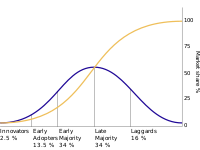
Photo from wikipedia
Abstract The modified free volume (MFV) theory was applied to evaluation of the self-diffusion coefficient of liquid hydrogen in which the nuclear quantum effect appears. The free volume of the… Click to show full abstract
Abstract The modified free volume (MFV) theory was applied to evaluation of the self-diffusion coefficient of liquid hydrogen in which the nuclear quantum effect appears. The free volume of the hydrogen was defined via the generic van der Waals (GvdW) equation of state, which was derived based on the centroid path integral notation. The computational results of the self-diffusion coefficient were compared to those of the experimental data, centroid molecular dynamics (CMD) methods, and previous studies. This comparison revealed that the self-diffusion coefficient of liquid hydrogen computed by means of the MFV theory reproduces the experimental data with the same precision as CMD and previous studies. In conclusion, even though the MFV theory is a completely classical mechanism, the self-diffusion coefficient of a quantum liquid can be calculated on the basis of the MFV theory by treating the centroid as a representative of the quantum molecule.
Journal Title: Chemical Physics
Year Published: 2020
Link to full text (if available)
Share on Social Media: Sign Up to like & get
recommendations!